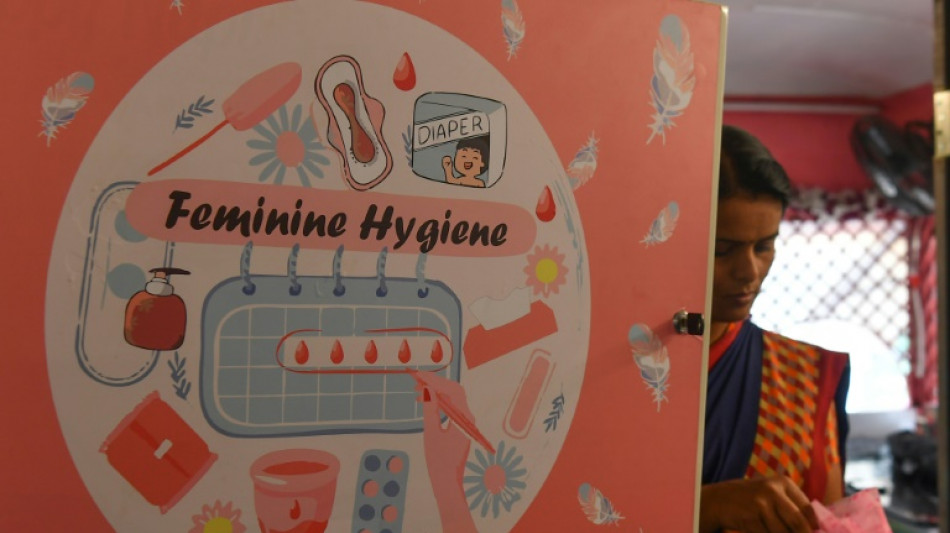
-
 France mourns Mayotte victims amid uncertainy over government
France mourns Mayotte victims amid uncertainy over government
-
UK economy stagnant in third quarter in fresh setback

-
 Sweden says China denied request for prosecutors to probe ship linked to cut undersea cables
Sweden says China denied request for prosecutors to probe ship linked to cut undersea cables
-
African players in Europe: Salah leads Golden Boot race after brace

-
 Global stock markets edge higher as US inflation eases rate fears
Global stock markets edge higher as US inflation eases rate fears
-
German far-right AfD to march in city hit by Christmas market attack

-
 Ireland centre Henshaw signs IRFU contract extension
Ireland centre Henshaw signs IRFU contract extension
-
Bangladesh launches $5bn graft probe into Hasina's family

-
 US probes China chip industry on 'anticompetitive' concerns
US probes China chip industry on 'anticompetitive' concerns
-
Biden commutes sentences for 37 of 40 federal death row inmates

-
 Clock ticks down on France government nomination
Clock ticks down on France government nomination
-
'Devastated' Australian tennis star Purcell provisionally suspended for doping

-
 Mozambique on edge as judges rule on disputed election
Mozambique on edge as judges rule on disputed election
-
Mobile cinema brings Tunisians big screen experience

-
 Philippines says to acquire US Typhon missile system
Philippines says to acquire US Typhon missile system
-
Honda and Nissan to launch merger talks

-
 Police arrest suspect who set woman on fire in New York subway
Police arrest suspect who set woman on fire in New York subway
-
China vows 'cooperation' over ship linked to severed Baltic Sea cables

-
 Australian tennis star Purcell provisionally suspended for doping
Australian tennis star Purcell provisionally suspended for doping
-
Asian markets track Wall St rally as US inflation eases rate fears

-
 Luxury Western goods line Russian stores, three years into sanctions
Luxury Western goods line Russian stores, three years into sanctions
-
Wallace and Gromit return with comic warning about AI dystopia

-
 Philippine military says will acquire US Typhon missile system
Philippine military says will acquire US Typhon missile system
-
Afghan bread, the humble centrepiece of every meal

-
 Honda and Nissan expected to begin merger talks
Honda and Nissan expected to begin merger talks
-
'Draconian' Vietnam internet law heightens free speech fears

-
 Israeli women mobilise against ultra-Orthodox military exemptions
Israeli women mobilise against ultra-Orthodox military exemptions
-
Asian markets track Wall St rally as US inflation eases rate worries

-
 Tens of thousands protest in Serbian capital over fatal train station accident
Tens of thousands protest in Serbian capital over fatal train station accident
-
Trump vows to 'stop transgender lunacy' as a top priority

-
 Daniels throws five TDs as Commanders down Eagles, Lions and Vikings win
Daniels throws five TDs as Commanders down Eagles, Lions and Vikings win
-
'Who's next?': Misinformation and online threats after US CEO slaying

-
 Only 12 trucks delivered food, water in North Gaza Governorate since October: Oxfam
Only 12 trucks delivered food, water in North Gaza Governorate since October: Oxfam
-
Telomir Pharmaceuticals Confirms Copper Binding Capabilities of Telomir-1 and Expands Pipeline Into Wilson's Disease

-
 Datametrex Cancels RSUS
Datametrex Cancels RSUS
-
South Star Battery Metals Announces Upsize of Non-Brokered Private Placement to Raise Up to US$3.20M, Extends Closing and Amended and Restated Stream Agreement

-
 Brightline Interactive Successfully Delivers A Scalable Immersive Simulation To A Global Government Service Integrator, Positioning Itself As A Leading Operating System For Processing And Visualizing Complex Information In 3D Space
Brightline Interactive Successfully Delivers A Scalable Immersive Simulation To A Global Government Service Integrator, Positioning Itself As A Leading Operating System For Processing And Visualizing Complex Information In 3D Space
-
Urb NM is Named "Fastest Growing" Marijuana Brand in New Mexico

-
 Alset AI Broadens Investment Policy to Embrace Decentralized AI, Quantum AI, Quantum Computing, and Cryptocurrency Opportunities
Alset AI Broadens Investment Policy to Embrace Decentralized AI, Quantum AI, Quantum Computing, and Cryptocurrency Opportunities
-
Strawberry Fields REIT Enters Into Agreement for Six Healthcare Facilities Located in Kansas

-
 NanoViricides is in a Great Position to Fight Potential Bird Flu Pandemic with a Drug that the Mercurial H5N1 Influenza A Virus is Unlikely to Escape
NanoViricides is in a Great Position to Fight Potential Bird Flu Pandemic with a Drug that the Mercurial H5N1 Influenza A Virus is Unlikely to Escape
-
Zomedica Launches Two New Quantitative Assays on the TRUFORMA(R) Platform: Canine NT-proBNP and Progesterone

-
 MainStreetChamber Holdings, Inc. Submits 15(c)211 Application
MainStreetChamber Holdings, Inc. Submits 15(c)211 Application
-
InterContinental Hotels Group PLC Announces Transaction in Own Shares - December 23

-
 Melrose Group Publicly Files Complaint to the Ontario Securities Commission
Melrose Group Publicly Files Complaint to the Ontario Securities Commission
-
Langers edge Tiger and son Charlie in PNC Championship playoff

-
 Explosive batsman Jacobs gets New Zealand call-up for Sri Lanka series
Explosive batsman Jacobs gets New Zealand call-up for Sri Lanka series
-
Holders PSG edge through on penalties in French Cup

-
 Slovak PM Fico on surprise visit to Kremlin to talk gas deliveries
Slovak PM Fico on surprise visit to Kremlin to talk gas deliveries
-
Daniels throw five TDs as Commanders down Eagles


How women have managed periods throughout history
Women have been managing their periods for millennia, but the way they do so has changed as menstruation has become more and less stigmatised over time.
From rags to tampons, menstrual cups and free-bleeding, take a tour of the history of period products on this Menstrual Hygiene Day.
- Not always taboo -
For most of human history, menstruation was very poorly understood.
In ancient times, it was often thought of negatively, the blood considered impure and periods thought to be a curse.
From the 15th century, "women would apply remedies, for example enemas, perform physical exercise or take emmenagogue plants", which helped regulate menstruation cycles, French historian Nahema Hanafi told AFP.
It was the job of the women in a teenager's family or community to inform her about periods. But they also discussed how it worked with men.
"In medieval and modern times, people talk about menstruation because it is a crucial health issue that concerns the whole family," Hanafi said.
Noble women, for example, would catalogue their periods in correspondence with their father or uncle.
However menstruation became taboo in the 19th century Europe with the rise of the middle class, which brought about new social norms, the historian said.
Modesty became a feminine virtue.
"In this movement, everything related to the body and sexuality was kept from women's sight, which prevented them from being informed about these subjects -- and from talking about them," Hanafi said.
- Rags attached with hooks -
Throughout history women mostly wore skirts or dresses.
Peasant women let the blood flow freely.
Middle class or high brow women used cloth, held in place by knots or hooks, to catch the blood.
However women had fewer periods than today, because they were more likely to be pregnant.
And girls used to get their first period years far later in life.
Girls got their period at around 16 years of age in 1750, compared with an average of 12.6 years today, according to the French Institute for Demographic Studies.
- The first products -
The first menstrual products started appearing towards the end of the 19th century, particularly in the United States and Britain.
"Early products sold in the US and the UK were rough, large and not particularly good," said Sharra Vostral, a historian at Purdue University who has written a book on the history of menstrual hygiene.
Sanitary pads became widely available from the 1920s, buoyed by mass advertising campaigns as companies targeted a new market. Tampons followed suit in the 1930s.
"Many people believed women were not qualified to do lots of things during their period," Vostral said.
Menstrual products helped women "hide their period and overcome prejudice... that's also why these products became very appealing," she said.
The menstrual cup first went on sale in the 1930s, but became more widely available in the 2000s.
- Sponges and reusable pads -
More options have been available to women in recent years, including reusable pads, sponges and period underwear.
"It took a very long time for period products to meet the needs and comfort of women," said Elise Thiebaut, author of the 2017 book "This is my blood".
The rise of social media has also seen more discussion and heightened awareness about menstruation. And some advertisements that had long used blue liquid to depict menstrual blood have now switched to red.
Are these signs that the stigma surrounding menstruation could be lifting?
Thiebaut said that the dialogue had changed "in an exceptional way over the past five years -- but it is in certain circles, certain generations, certain countries."
Ch.Havering--AMWN


